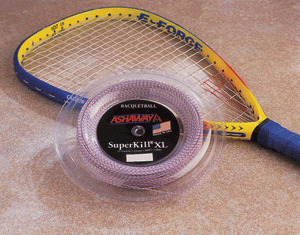|
|

Sponsorships, Part Two
By Steve Crandall
Vice President, Sales & Marketing
Ashaway Racket Strings

Sponsorships are business arrangements, and most manufacturers have specific application processes and require signed contracts which entail obligations on both sides - like showing the company logo on your equipment. |
In my last column, we talked about the subject of sponsorships from a player's point of view with Racquetball legend and long-time Ashaway sponsored player Jack Huczek. This month, I'd like to look at the same topic from the manufacturer's point of view: as they say, it takes two to tango. Actually, it can take more than that, which is one of my main points.
Sponsorships are a kind of tide that floats all boats. Sponsorships are good for players; they're good for manufacturers; they're good for state associations, tournament organizers and local clubs; they're good for the entire sport.
But understand that manufacturers do not sponsor players solely out of charity or as an act of philanthropy or kindheartedness. Those attitudes may be there, to be sure, but at base, sponsorships are part of our marketing programs, and like any other business activity, they must be accounted for and meet specific objectives. But in doing so - when done well - they create synergy which can be defined as: A mutually advantageous conjunction where the whole is greater than the sum of the parts.
So manufacturers like sponsorship programs, and we generally benefit from them, but they are not just about giving away free (or discounted) string, or racquets, or other equipment. Sponsorships are business arrangements, and most manufacturers have specific application processes and require signed contracts which entail obligations on both sides.
Most manufacturers also have many more applicants than they can possibly sponsor, and in our case at least, it's not just the best players we're looking for. The criteria we look for are people who are involved in racquetball at all levels, who actively promote racquetball in their area, especially stringing, and are active in the racquetball community. Jack used the term "ambassador" to describe the role of sponsored players; we look for people who are ambassadors for the whole sport: if they are good ambassadors for the game, we know they will also be good ambassadors for Ashaway.
So it's not just the best players. Obviously, the better a player is, the more often they're on the court and the more exposure to Ashaway we'll get. But what's more important from our perspective is how involved are they with stringing in their area, and how are they active in their state association and that type of thing. We're looking for the best ambassadors, and they come in all different skill levels, all different ages. Our slant is stringing, so somebody who is involved in stringing in their community, and can demonstrate that, will be important to Ashaway even if they're not that great a player.
Nor do we only sponsor players. We also sponsor people who do the stringing, people who are racquetball directors at their clubs or their YMCA, people who are organizers, promoters of the sport. We know if they are going to promote the sport they are going to promote our brand as well. We also sponsor tournaments, but that may be a subject for a column in itself.
In terms of give and take - or our "return" on our sponsorship investment - there is a sliding scale. With a player like Jack who is one of the top players in the world, visibility for our brand is tremendous. His endorsement of our string has great impact and of course, the terms of his sponsorship deal reflect that. At the other end of the scale, many of our applicants are junior players. These young folk are often more in need of the modest cost benefits sponsorships can provide, but the value of their endorsement is considerably less. However, the fact of being sponsored often gives these juniors a boost of confidence and enthusiasm which is worth more than money. They become the leaders of tomorrow.
So our advice to juniors - or to anyone seeking sponsorship - is to be the best player you can, by all means. But more than that, be willing to give back and be a good ambassador for the sport. Work with your state association, your league, club or team, and help grow the game. That way, you'll help bring others to the sport and help generate that synergy that will also help grow our stringing business. It's a win-win.
This article previously appeared in Racquetball Magazine.
|